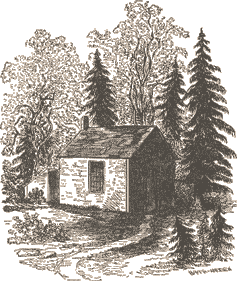|
|
|
|
|
|
|
|
Walden Study Text
I do not propose to write an ode to dejection,
|
 The original title page |
Perhaps the most useful way to look at the form of Walden is to think of it as negotiating the cracks, not only between past and future but between all kinds of dualities: society and the individual, sounds and silence, body and spirit, form and flux, &c. As soon as you think you have him pinned down to an idea, he slips right out to play with its opposite! As Bickman says, "there are moments -- moments that, with patience, receptivity, and luck, we can perceive -- before spirit and matter, life and death, childhood and adulthood, flux and form split apart from each other, moments when they are not only credible to each other but embrace each other as well." (59) It is Thoreau's desire to create these moments, or at least arrange his words and chapters so they may spring up for his readers.

Language
"Where I Lived and What I Lived For" is a particularly good example of Thoreau's addiction to puns, or words which sound alike but have different meanings. It takes a very alert reader to pick up most of them, because few of us are as sensitized to language as he was. (His ability to read Greek, Latin, and old English taught him much about the primitive sources of words, and those early meanings which they retain to some degree). Sometimes these puns are humorous, jokes for those who are "in the know." More often they are the sources of serious metaphors for this transcendentalist writer who believed that abstract, spiritual reality is thoroughly embedded in physical reality, rightly seen. Virtually every account he gives of his actual experiences can also be interpreted metaphorically, as he uses the concrete world to suggest unsayable truths.
Thoreau was also very fond of paradoxes, or statements which seem to be logically contradictory but do present a truth which reconciles the contradiction. One example in "Economy" is his conclusion that the savage may actually be the truly civilized man. Paradoxes like this often depend on his redefinition of a key term. Such redefining is most clearly seen in sentences like "To be awake is to be alive."
Rhetoric
Walden is a book written very directly to its readers, and it intends for them to be provoked into thought. The final sentences: "There is more day to dawn. The sun is but a morning star." -- show that the book can only be completed by its reader, if then. Perhaps the best characterization of the book comes in Bickman's final paragraph, which pulls together the arguments of his book:
Walden is thickly allusive, sometimes pedantic, and yet tries to wean us from a dependence on books, including itself. It attempts to create for itself a permanent structure, yet one that is open and responsive to the unexpected spontaneities of life. It tries to fashion a new language by burrowing into the most antiquarian roots of the one we have already. It gives us a sense of future possibilities by appealing to some of our most regressive fantasies. It embeds itself in the Western philosophical and religious tradition only to undermine its basic assumptions. And it engages all these complexities in the context of a plea for simplicity, simplicity. Its final wisdom is that there is no final wisdom, that all truths are mediate, volatile, and that what can be conveyed to a reader is not a teaching but an intensity of response to life. (121)
[Inspired by Martin Bickman's Walden: Volatile Truths, which contains an excellent updated and annotated bibliography if you wish to read further.]
Introduction to the structure of Walden. An audio file by Ann Woodlief, VCU. (Requires Real Player)
![]() Selected Literary Criticism on Walden
Selected Literary Criticism on Walden
|
Home: Authors & Texts: Thoreau: Walden |
|
|
|
|
|
|
and may not be reproduced in any way without explicit written permission.
Web and graphic design for this site copyright © Psymon.
All Rights Reserved.